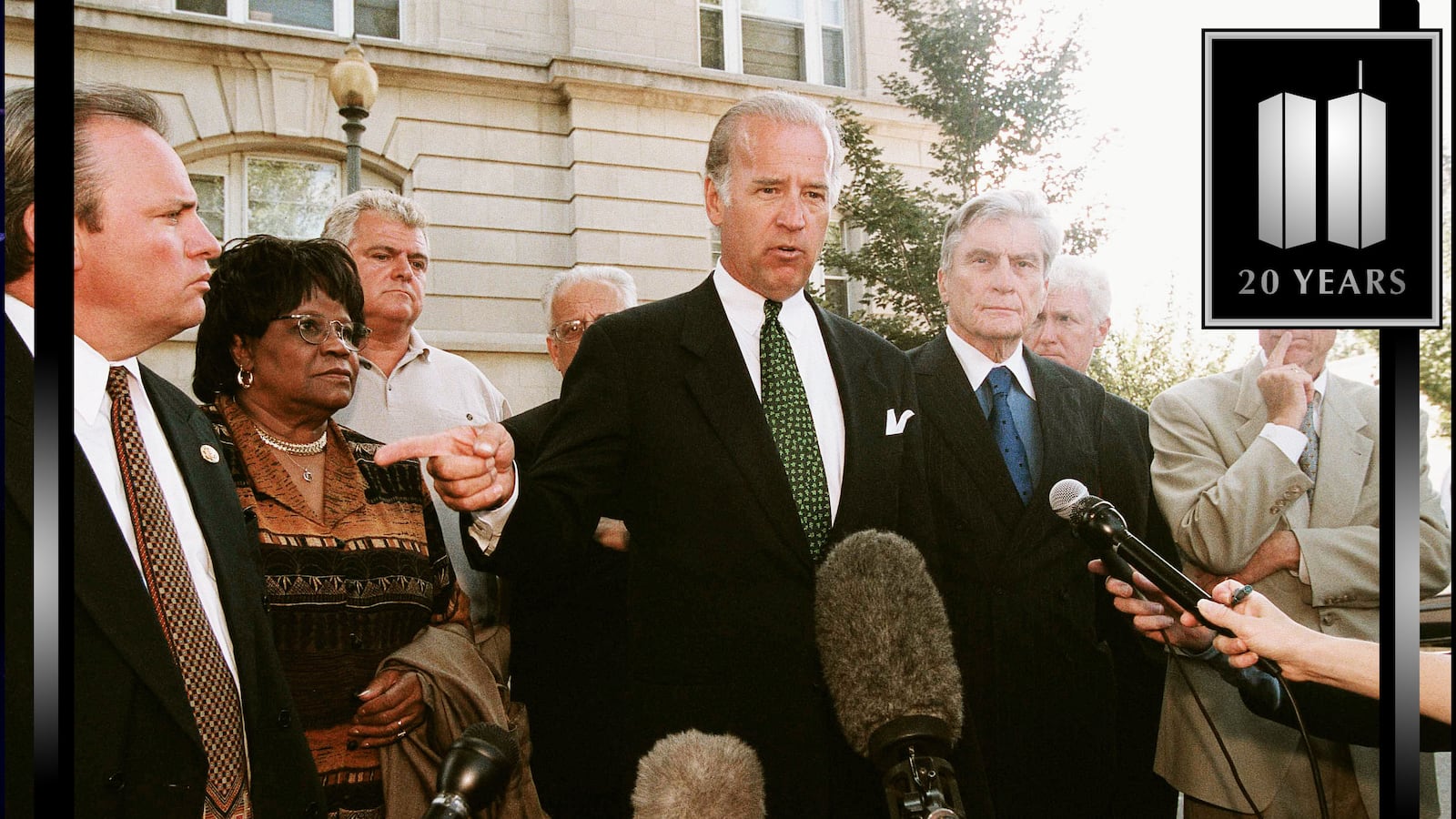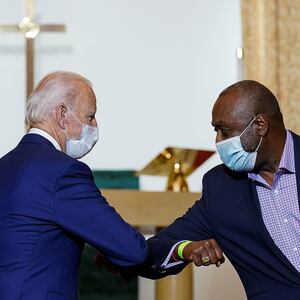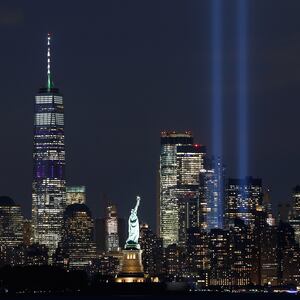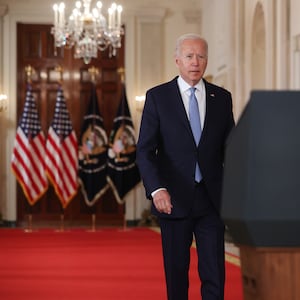Twenty years ago tomorrow, as smoke from the Pentagon rose into the sky across the Potomac, Joe Biden was squaring off with security on the steps of the U.S. Capitol.
“I remember him walking up to the steps of the Capitol trying to get in, and there were a bunch of Capitol Police officers around him saying, ‘we can’t let you in there,’ and he’s like, ‘I’ll go in by myself,’” recalled Margaret Aitken, who was then-Senator Biden’s press secretary at the time. “He actually wanted to be on the floor—he said, ‘just turn the camera on and I’ll give a speech.’ I think he thought at that point that it was important that the world see that our government was operational.”
At that moment on Sept. 11, 2001, President George W. Bush, who had delivered a 77-second address on the attacks before being rushed to Air Force Once, was in midair, his destination unknown even to staff. Vice President Dick Cheney was in a bunker beneath the East Wing of the White House, the first of many undisclosed locations to which he would be shuttled over the following days. Members of House and Senate leadership were about to board helicopters bound for West Virginia. There was, in the words of one former Biden staffer, “a vacuum of visible leadership” at a moment of national catastrophe.
In that moment, Biden was adamant that the American people needed to see that their leadership had not abandoned them—even if that leadership was just a single senator addressing unmanned C-SPAN cameras.
“I was shuttling back and forth between floors, trying to persuade anyone who would listen that we should get back in session and show the American people we were taking care of business,” Biden later recalled in his 2007 memoir Promises to Keep. “Nobody would budge.”
“It was really, really important to him that the world see that our government didn’t shut down and the Capitol Police were like, ‘No, we’re shut down,’” the former staffer told The Daily Beast. “I remember watching this poor young Capitol Police officer saying, like, ‘Please don’t try to go on the floor because I’ll have to arrest you.’”
Locked out, Biden did the next best thing, delivering a message of reassurance to evacuated congressional staffers, reporters, and even passing tourists in the park next to the Russell Senate Office Building.
“He was stopping people on the street. People were coming up to him and he was reassuring people on the street saying, ‘We’re going to be OK, this is going to be OK,’” Aitken said. “People were looking for someone with a message, and his message was really very calming and very reassuring: we are strong as a country, we are resilient as people, and we’re going to be OK, and we’re going to get through this.”
With the nation under attack and its leadership almost invisible, Aitken said, “that was something that really people needed to hear. And he was doing that as best he could that day.”
Biden’s attempt to calm a terrified nation was not exhaustively documented at the time. Despite what he later called “a moment of almost total silence” from elected officials on the day of the attacks, national political leaders soon returned to the stage to reassure the public or make the case for war. But as half a dozen former staffers, advisers and friends of the president recalled in conversations with The Daily Beast, Biden’s actions in the aftermath of 9/11 crystallize his response to tragedy, crisis and grief, and presaged the man that the nation has come to know during the coronavirus pandemic: profoundly empathetic towards the suffering of others, relentlessly optimistic, and still convinced of America’s ability to withstand any hardship—as long as its citizens stand together.
“I think there’s a direct parallel to COVID,” one person who was a staffer in Biden’s Wilmington office at the time said. “His message is always one of intense optimism and faith in the American spirit—sometimes despite having basically every reason not to.”
Biden began his day on Sept. 11, 2001, as he normally did: on the Amtrak train from Wilmington to Washington’s Union Station.
Nearing the end of his fifth term in the U.S. Senate, Biden was one of the body’s most powerful and influential members, the newly minted chairman of the Senate Committee on Foreign Relations and a perpetual subject of presidential speculation. But despite those credentials and a few higher-profile moments over the course of his political career—a fumbling initial run for the White House, his chairmanship of the Senate Judiciary Committee during the Anita Hill hearings—Biden did not share the profile of fellow senators Ted Kennedy or Hillary Clinton.
“He was a nationally recognized leader in the Senate at that point, obviously,” a Biden family friend said, “but he didn’t necessarily have the walk-a-mile-for-a-photo-op instinct that some of his peers did.”
But when he left the train station that Tuesday for the quick three-block walk to the Russell Senate Office Building, Biden was one of the only people in sight who was not quickly losing composure.
“There was a gathering feeling of panic on the ground in Washington,” Biden wrote in his memoir. “The Capitol building had already been evacuated. Senators, House members, and their staffs were milling around the park between the Capitol and Union Station.”
His wife, Dr. Jill Biden, had called to let him know about the Twin Towers, according to former staff, and other staffers who had been watching television in his Senate office had just learned that the Pentagon had been hit when the Capitol was ordered evacuated at 10:15 a.m.
“I could see a haze of smoke rising from the Pentagon across the Potomac,” Biden wrote. “It was a moment of surreal stillness.”
But there was no telling what could come next; there were already reports of other hijacked planes, of car bombs at the State Department and threats against Camp David and Air Force One. Only 12 minutes before the Capitol complex was ordered to be evacuated, United Airlines Flight 93 had crashed into a Pennsylvania field, the Capitol later determined to be its likely target.
Biden couldn’t have known that when he attempted to get into the building, but in hindsight, staffers recognized his attempt to speak from an empty Senate chamber was enormously risky.
“At that point, the Twin Towers had both collapsed, you could literally see the smoke coming up from the Pentagon, and we had no idea how many more planes there were,” one former legislative aide said. “He had to have known that the Capitol was the most dangerous building in the world to be inside, at that point.”
Following his thwarted attempts to speak on the Senate floor, Biden instead delivered what amounted to an impromptu speech to reporters in the park near Union Station, telling Americans that the nation had “come face-to-face with a reality, a realty we knew existed and we knew was possible, a reality that has happened to varying degrees in other countries,” but one that could not be allowed to change the American way of life.
“This nation is too big, too strong, too united, too much a power in terms of our cohesion and our values to let this break us apart,” Biden told reporters. “And it won’t happen. It won’t happen.”
Biden’s attempts to persuade other members of Congress to resume business ultimately failed, and he carpooled back to Wilmington with Rep. Bob Brady, a Democrat from Pennsylvania who had also been pushing for Congress to go back into session. But rather than return home for the night, Biden, still frustrated by his colleagues’ decision, instead headed to his district office on Market Street, where staffers had been working feverishly to aid constituents who were missing in the attacks, or who had been stranded by the shutdown of the nation’s airspace.
“Everybody made a concerted effort on staff to stay,” said Brian M.P. McGlinchey, who worked as projects director and special staff assistant in Biden’s office at the time. “And lo and behold, who shows up with pizza? Nobody but the senator himself.”
Holding stacks of boxes of pizza from Gerardo’s, a longtime favorite spot, Biden gathered the office in a circle and urged them to keep working on behalf of the people of Delaware, and the people of the United States.
“Everybody was very tired, everybody was looking for answers, everybody was confused. And his natural instinct to lead was just incredibly reassuring. It was that of a father speaking to his family: we’re gonna be OK, we’re gonna get through this,” said McGlinchey. “And honest to God, it was literally like somebody flipped a switch. It was a coach speaking to the team in the locker room. And I think we finally shut off the lights around midnight that night.”
“People sense panic. People also sense when someone is in control. And there was no doubt who was in charge and who was in control,” McGlinchey said.
In Washington the next day, Biden delivered similar remarks to his assembled staff—the remarks he had likely been hoping to deliver directly to the American people the day before.
“The next day in our staff meeting, he just gave this really incredible, very moving, reassuring, calming speech about the United States and how we’ve always overcome adversity when we come together and how this is not the end of us this is, we are going to come back stronger,” Aitken said. “For me sitting as a staff member in there, I remember thinking to myself, ‘God, I wish my mom could hear this,’ you know? Because it wasn't something that anybody at that time was really talking about.”
A few members of Biden’s staff began brainstorming the proper platform for a version of the remarks that they had found so inspiring in the hours after the attacks that had left many of them deeply unsettled—both about the nation’s security and their own. Some floated an address at the Council on Foreign Relations or at the National Press Club, regular spots on the speaking circuit for committee chairmen.
“Great, for the 15 people who see that,” one longtime staffer remembered thinking.
Aitken suggested something less staid: The Oprah Winfrey Show, which had been interrupted the day before for the first time in 15 years on the air as networks aired wall-to-wall coverage of the attacks and their aftermath.
Some scoffed at the idea that Winfrey’s show was the appropriate venue for the chairman of the Senate Committee on Foreign Relations to deliver remarks to a grieving nation.
“It’s hard to envision now, but in 2001, Oprah was still a little too ‘daytime’ for the chattering class. When they thought of Oprah, they thought of Jack Hanna letting lemurs crawl over furniture,” one family friend said. “I can imagine it didn’t immediately seem like a no-brainer to people who not only didn’t watch Oprah, but probably didn’t even know anybody who watched Oprah.”
But Aitken, thinking of her mother and the people like her who would find value in Biden’s optimism in the face of tragedy, pushed for Winfrey’s show.
“He listened to all of us, and then he looked at me and he said, ‘get her on the phone,’” Aitken said. “It took me an entire day to get her on the phone—and I have gotten heads of state on the phone quicker than that.”
According to one person present for the call, Biden made the case to Winfrey that with her platform—The Oprah Winfrey Show was then broadcast daily to 134 countries around the world—she had the opportunity to spread the message that there was nothing that the United States couldn’t do when its people came together.
Fifteen minutes later, Winfrey’s staff called back and asked Biden to deliver that message on her next episode.
After two days of being pre-empted by news coverage, The Oprah Winfrey Show returned with a lengthy slate of 9/11 coverage, from interviews with family members of victims to panel discussions with Muslim women about threats they now faced in the wake of the attacks. On Monday, Sept. 17, appearing via satellite from Delaware, Biden joined Winfrey’s latest episode: “America Under Attack: Where Do We Stand Now?”
“Six days later, what should our country do? Who is our enemy and where are they? What is next?” Winfrey mused at the beginning of the episode, before introducing Biden, “a key player in helping determine how our country will respond to these attacks.”
Biden told Winfrey that Americans should focus on two things: properly mourning those lost, and acting methodically to find and punish those responsible.
“This initially is a time to mourn—it’s not a time to be afraid. And this is a time for us to not precipitously react,” Biden said. “These terrorist groups have so far crossed the line, they’ve sown the seeds of their destruction.”
The episode is not available for streaming on any platform, with only a short YouTube clip of Biden reading a letter penned by the son of the president of the University of Delaware marking Biden’s appearance. But a copy of the episode transcript provided to The Daily Beast reveals remarks on the program are, in many ways, vintage Biden before they were vintage.
The senator told Winfrey that the U.S. government knew where Osama bin Laden was, clearly overconfident in the ability to track down the mastermind of the attacks; he stumbled over the name of Admiral Isoroku Yamamoto before dubbing him “the admiral who was in charge of that attack on the United States” in Pearl Harbor; he interrupted his own thoughts with other related thoughts and apologized for speaking too long.
But they also previewed the Biden yet-to-come, the Reassurer-In-Chief, the leader of a country in the throes of a very different catastrophe.
“They do not have the capacity to take this nation down,” Biden told the studio audience, reassuring them that President Bush “has his eye on the ball” and emphasizing that the United States was building a global coalition to keep the nation safe.
“Let's not exaggerate who these guys are. This is not the Soviet military. This is not the Chinese nuclear arsenal, as small as it is. This is a relatively small group of people. They number in the tens,” Biden said of the perpetrators of 9/11, in response to an audience question about whether the country was prepared to withstand more terrorist attacks. “It took them all this time, several years, for them to plan this whole process here, and the ability for them to do something like this simultaneously again is close to zero.”
“This is a horrible thing that happened, but it’s also awakened America to begin to focus on the priorities.”
For staffers, the appearance—which, unlike most major media appearances, hadn’t been prepped beforehand by aides armed with briefing books and talking points—crystallized Biden’s deep, often brutally personal understanding of people’s needs in times of grief.
“That was really just his general demeanor all the time. During times of crisis, he’s particularly gifted at it, and that comes I think stems directly from his personal experience,” said McGlinchey. “He knows to appeal to people's best instincts.”
“That’s his personality,” echoed Aitken. “I don’t think it’s a messaging thing—I think that’s really who he is as a person. He’s a healer, he's very patriotic, he believes deeply in this country, and the people in this country and our strength and resilience.”
After Biden recited the lengthy letter written by a friend’s son, which noted that the nation has “fought evil” in the past while still preserving its constitutional rights, its values, and “everything that’s so important in America.” But before thanking Winfrey for having him on the show, Biden directed his attention to the audience one more time.
“Have hope,” Biden said. “We will do this. America will not change.”




